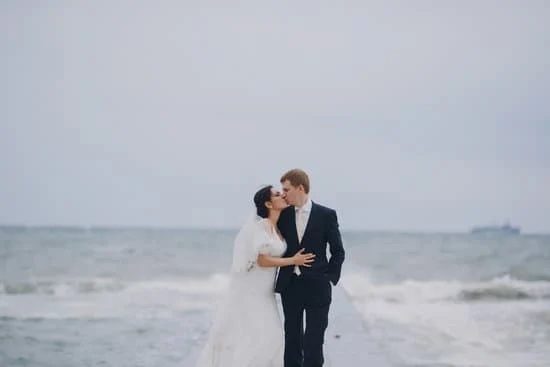A Haitian wedding is a vibrant and colorful celebration that beautifully showcases the rich cultural traditions of Haiti. From the history and significance of marriage in Haitian culture to the traditional customs, rituals, fashion, and cuisine, a Haitian wedding is a beautiful reflection of the love and deep-rooted traditions of the Haitian people.
In this article, we will delve into the history and significance of marriage in Haitian culture, exploring how it has evolved over time and what it means to the community. We will also take a closer look at the traditional customs and rituals that are integral parts of a Haitian wedding ceremony, as well as the role of family and community in ensuring a meaningful celebration.
Furthermore, we will explore the vibrant colors and fashion associated with a Haitian wedding, as well as the delicious cuisine and traditional dishes that are enjoyed during these joyous occasions. Additionally, we will discuss the lively music and dancing that are central to the celebration of a Haitian wedding, as well as how modern influences and trends have shaped contemporary Haitian weddings.
History and Significance of Marriage in Haitian Culture
The history and significance of marriage in Haitian culture is deeply rooted in tradition and spiritual beliefs. Marriage is considered a sacred union between two individuals, and it holds immense importance within the Haitian community. In Haitian culture, the institution of marriage symbolizes not only the unity of two people but also the coming together of two families and communities.
Historically, arranged marriages were common in Haiti, where parents would arrange the union of their children based on social and economic standing. While this practice has become less common in modern times, the idea of family involvement in marriage remains prevalent. Marriage is seen as a way to strengthen social ties and create alliances between families, making it an integral part of Haitian society.
In addition to its social significance, marriage plays a crucial role in religious and spiritual practices in Haiti. Many Haitians are Roman Catholic or Protestant, so weddings often incorporate religious ceremonies and rituals. Vodou traditions may also be integrated into wedding ceremonies for those who practice this Afro-Caribbean religion. The blending of religious customs with cultural traditions makes Haitian weddings rich with symbolism and spiritual meaning.
Finally, the concept of love and commitment is central to Haitian marriages. While practical considerations such as financial stability are important, love is considered essential for a successful marriage. The celebration of love through marriage is evident in the joyous festivities that accompany a haitian wedding ceremony.
| Marriage Importance | Religious Significance |
|---|---|
| Symbolizes unity between two individuals, families, and communities | Incorporates Roman Catholic, Protestant, or Vodou traditions |
| Historically involved arranged marriages based on social and economic standing | Blends religious customs with cultural traditions |
Traditional Haitian Wedding Customs and Rituals
Pre-Wedding Ceremonies
Before a Haitian wedding, there are several traditional pre-wedding ceremonies that take place. One of these is the “Rache Kout Kouto” ceremony, where the family of the bride and groom come together to sharpen knives in preparation for the wedding feast. Another important pre-wedding ritual is the engagement party, known as “Engagement la Fiançailles.” During this event, the families of the bride and groom exchange gifts and blessings to celebrate the upcoming union.
Wedding Attire and Jewelry
In a Haitian wedding, both the bride and groom wear traditional attire that reflects their cultural heritage. The bride often wears a colorful dress called a “robe couleur,” which is adorned with intricate beadwork and embroidery. The groom complements her attire with a “chemiz,” a shirt made from fabric that matches the bride’s dress.
In addition to their attire, jewelry plays a significant role in Haitian weddings. Brides wear elaborate headpieces and jewelry, while grooms adorn themselves with stylish accessories such as cufflinks and belts.
The Ceremony Itself
During the wedding ceremony, there are various customs and rituals that are unique to Haitian culture. One of these traditions is “the sharing of rum,” where the couple takes part in drinking a special blend of rum from a single cup. This symbolizes their unity and commitment to each other. Additionally, traditional Vodou rituals may be incorporated into the wedding ceremony, adding depth and spiritual significance to the union.
These customs and rituals showcase the deep-rooted traditions that make a Haitian wedding truly memorable and meaningful. Throughout every step of the wedding process, rich cultural heritage and symbolism play an integral role in celebrating love and unity within Haitian communities.
The Role of Family and Community in Haitian Weddings
In Haitian culture, family and community play a significant role in the celebration of weddings. The support and involvement of loved ones are integral to the success and joy of the marriage. Haitian weddings are not just the union of two individuals, but also the merging of two families and communities.
Family Blessings
In Haiti, it is customary for both families to come together to offer blessings and well-wishes to the couple before they tie the knot. This symbolizes unity and camaraderie between the families, as they join forces to support the new husband and wife. Elders in the family often play a special role in bestowing their wisdom and giving advice to the newlyweds, emphasizing the importance of family values and traditions.
Community Support
The wider community also plays a crucial part in Haitian weddings. It is common for neighbors, friends, and even distant relatives to be involved in various aspects of the wedding planning process.
Whether it’s helping with decorations, providing music for the celebration, or contributing financially, members of the community come together to show their love and support for the couple. This collective effort creates a sense of solidarity and reinforces the idea that marriage is not just between two people, but between two extended networks of relationships.
Unity Through Celebration
During a Haitian wedding celebration, family members often take on different roles such as leading traditional dances, offering prayers, or performing special rituals that honor their cultural heritage. This communal participation infuses the event with a deep sense of tradition and ensures that everyone feels connected to the union taking place. The coming together of family and community creates an atmosphere filled with love, support, and joy as everyone celebrates this momentous occasion.
Overall, family and community hold a sacred place in Haitian wedding ceremonies. Their involvement strengthens bonds, upholds traditions, and makes these celebrations truly unforgettable experiences filled with love and unity.
The Vibrant Colors and Fashion of a Haitian Wedding
In a traditional Haitian wedding, it is customary for the bride to wear an extravagant gown in shades of white or ivory. The dress is often adorned with intricate embroidery and lace details, and can be accessorized with a matching veil.
The groom typically wears a suit in a complementary color, but may also opt for a more formal ensemble such as a tuxedo. It is common for the bridal party and guests to also wear colorful attire, adding to the overall visual feast of hues at the wedding.
As for fashion accessories, Haitian brides often don intricate headpieces or headdresses that are adorned with beads and jewels. These accessories serve as stunning focal points and add an extra element of glamour to the bride’s ensemble. Additionally, jewelry plays an important role in completing the wedding day look, with bold earrings, necklaces, and bracelets being popular choices.
The color palette at a Haitian wedding is nothing short of eye-catching. Vibrant shades such as fuchsia, turquoise, yellow and orange are commonly seen at these celebrations. These striking colors are not just limited to clothing; they also extend to decorative elements such as flowers adorning the venue and vibrant table settings. The use of bold hues contributes to creating an atmosphere of joy and festivity throughout the festivities.
| Haitian Wedding Attire | Vibrant Colors |
|---|---|
| Bride wears an extravagant gown | Shades of white or ivory |
| Groom wears suit or tuxedo | Complementary colors |
| Bridal party and guests wear colorful attire | Fuchsia, turquoise, yellow, orange |
Delicious Haitian Wedding Cuisine and Traditional Dishes
Haitian cuisine is an integral part of the wedding celebration, with traditional dishes and flavors playing a significant role in the festivities. From the savory to the sweet, Haitian wedding cuisine reflects the rich cultural heritage of the country and holds deep significance for the newlyweds and their families.
One of the most important dishes in a Haitian wedding is “Pikliz,” which is a spicy pickled vegetable condiment. It is often served as a side dish to accompany many of the main courses.
Another staple at Haitian weddings is “Joumou,” a flavorful pumpkin soup that symbolizes prosperity and good fortune for the newlyweds. Additionally, “Diri Djon Djon,” a rice dish made with black mushrooms, is commonly served at Haitian weddings, representing richness and abundance for the couple’s future life together.
Aside from these symbolic dishes, there are also mouthwatering desserts such as “Dous Makos,” a layered coconut fudge, and “Pen Patat,” a sweet potato pudding. These delectable treats add sweetness to the celebration and are enjoyed by all attendees. The culinary traditions of a Haitian wedding not only delight the taste buds but also carry deep cultural meaning and significance for those partaking in these delicious delights.
Beyond just satisfying hunger, food at a haitian wedding serves as an expression of hospitality and community. It brings people together to share in the joyous occasion, fostering connections among family and friends. This communal aspect of enjoying traditional Haitian cuisine creates an atmosphere of warmth and love, enhancing the overall experience of celebrating love through marriage in Haiti.
Music and Dancing
Music and dancing are essential elements in the lively celebration of a Haitian wedding. The atmosphere is always filled with joy, energy, and vibrant rhythms that reflect the cultural heritage of Haiti. Traditional Haitian music, such as compas, rara, and twoubadou, sets the tone for the festive occasion.
During a Haitian wedding, guests participate in lively dances that showcase the unique movements and expressive gestures of the traditional folk dances. One popular dance style is the merengue, which involves lively hip movements and energetic footwork. Another common dance is the konpa or compas, characterized by its smooth and rhythmic movements that encourage guests to join in and celebrate the love and unity of the newlyweds.
The music played at a Haitian wedding also reflects the diverse influences that have shaped Haiti’s musical landscape. From African rhythms to French ballads to Caribbean beats, each song tells a story and adds to the vibrant tapestry of sounds that fill the air during this special celebration.
As part of these joyous occasions, live bands or DJs are often hired to ensure that guests are entertained throughout the festivities. Whatever their choice may be between a live band or DJ playing at their event; it does not take away from what a haitian wedding means to them as couple.
In summary, music and dancing play an integral role in a Haitian wedding ceremony. They create an atmosphere of love, unity, and excitement as family and friends come together to celebrate the joining of two lives in matrimony amidst traditional songs,dances good ambiance which help enhance more love during this memorable event.
Modern Influences and Trends in Contemporary Haitian Weddings
In recent years, there has been a noticeable shift in the traditional customs and rituals of Haitian weddings, with modern influences and trends making their mark on these beautiful ceremonies. From changing fashion trends to innovative cuisine choices, contemporary Haitian weddings are embracing new elements while still holding on to their rich cultural traditions.
One of the most significant modern influences on Haitian weddings is the incorporation of technology. Many couples are now incorporating social media and digital platforms into their wedding celebrations, creating personalized hashtags for their special day and encouraging guests to share their photos and well wishes online. This trend not only allows for greater connectivity among family and friends but also serves as a lasting digital archive of the wedding festivities.
Another modern influence in contemporary Haitian weddings is the fusion of different cultural elements. With a growing Haitian diaspora around the world, many couples are finding ways to incorporate diverse cultural traditions into their wedding ceremonies. This could include blending Haitian and Western wedding customs, or even incorporating elements from other Caribbean or African cultures. The result is a unique and vibrant celebration that celebrates love across different cultural backgrounds.
Furthermore, contemporary Haitian weddings are also seeing a shift in fashion trends, with many couples opting for modern twists on traditional attire. While classic Haitian wedding attire often includes vibrant colors and intricate embroidery, modern brides and grooms are experimenting with different cuts, fabrics, and styles to put their own personal twist on their wedding ensembles.
Additionally, there has been an increase in non-traditional wedding venues such as beach resorts or urban rooftops, adding a touch of modernity to the celebration of love.
Overall, while contemporary Haitian weddings continue to honor age-old traditions and customs, they are also embracing modern influences that reflect the evolving nature of love and marriage in today’s world. The enduring beauty of a haitian wedding shines through as it gracefully adapts to the changing times while still holding onto its cherished cultural heritage.
Conclusion
In conclusion, a Haitian wedding is a beautiful and heartfelt celebration that incorporates rich cultural traditions, deep family connections, and vibrant expressions of love. The history and significance of marriage in Haitian culture are deeply rooted in the community and the joining of two individuals in a lifelong commitment. The traditional customs and rituals of a Haitian wedding are steeped in symbolism and meaning, creating an unforgettable experience for both the couple and their guests.
One of the most striking aspects of a Haitian wedding is the role of family and community. The love and support of relatives and friends are central to the celebration, making it a truly communal affair.
From lively music and dancing to colorful fashion and delicious cuisine, every element of a Haitian wedding reflects joy, love, and unity. Even as modern influences and trends make their mark on contemporary Haitian weddings, the enduring beauty of these ceremonies lies in the preservation of cultural customs that honor the sacred bond of marriage.
In essence, a Haitian wedding is not just about two people coming together in matrimony; it is a celebration that embodies the spirit, culture, and traditions of Haiti. The vibrant colors, lively music, delicious cuisine, and deep sense of community all come together to create an unforgettable experience for all involved. Whether following traditional customs or embracing modern influences, the enduring beauty and love of a Haitian wedding ceremony continue to shine bright for generations to come.
Frequently Asked Questions
What Is a Traditional Haitian Wedding?
A traditional Haitian wedding is a lively and colorful celebration that incorporates both Christian and Vodou rituals. It often includes music, dancing, and a festive atmosphere to bring together the bride and groom’s families.
Where Was a Haitian Wedding Filmed?
The Haitian wedding was filmed in Haiti, usually in a picturesque location such as a beach or a historical site. The beautiful scenery of Haiti serves as a stunning backdrop to the joyous occasion of the wedding.
What Do Haitians Do at Weddings?
At Haitian weddings, guests typically participate in various customs and traditions including the presentation of gifts, sharing meals, and participating in group dances. Music plays a significant role, with live bands or DJs providing entertainment throughout the celebration. Additionally, there are often religious elements such as prayers and blessings incorporated into the ceremony.

Welcome to my blog about home and family. This blog is a place where I will share my thoughts, ideas, and experiences related to these important topics. I am a stay-at-home mom with two young children. I hope you enjoy reading it! and may find some helpful tips and ideas that will make your home and family life even better!





